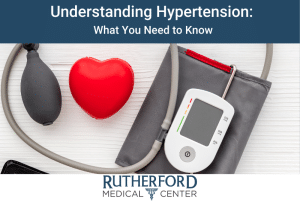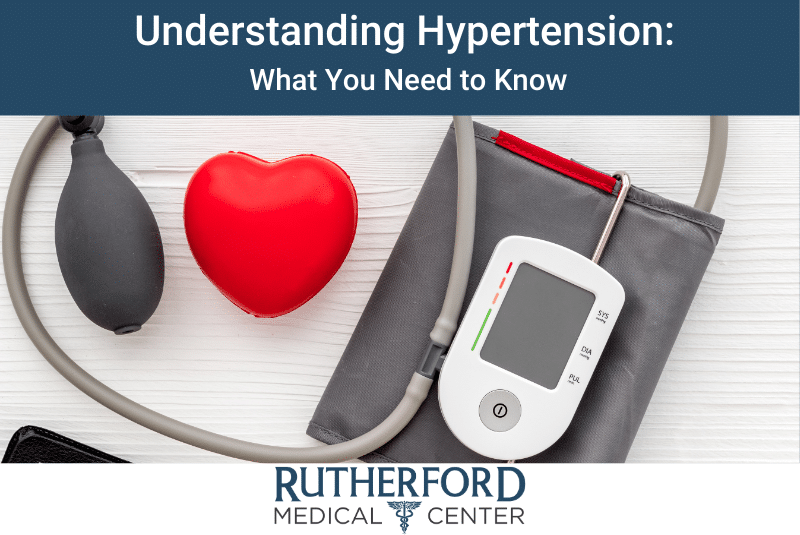May 1, 2025
 Hypertension, commonly known as high blood pressure, is a prevalent condition affecting millions of individuals globally. Often referred to as the “silent killer,” it can go undetected for years but is a significant risk factor for heart disease, stroke, and other serious health problems. At Rutherford Medical Center, we are dedicated to helping patients understand, manage, and prevent hypertension, ensuring a healthier and more fulfilling life.
Hypertension, commonly known as high blood pressure, is a prevalent condition affecting millions of individuals globally. Often referred to as the “silent killer,” it can go undetected for years but is a significant risk factor for heart disease, stroke, and other serious health problems. At Rutherford Medical Center, we are dedicated to helping patients understand, manage, and prevent hypertension, ensuring a healthier and more fulfilling life.
What is Hypertension?
Hypertension occurs when the force of the blood against the walls of your arteries is consistently too high. Blood pressure is measured in millimeters of mercury (mmHg) and recorded with two numbers:
- Systolic Pressure: The pressure in your arteries when your heart beats.
- Diastolic Pressure: The pressure in your arteries when your heart rests between beats.
A normal blood pressure reading is typically around 120/80 mmHg. Hypertension is generally diagnosed when blood pressure readings consistently exceed 130/80 mmHg.
Causes of Hypertension
Hypertension can be categorized into two main types:
- Primary (Essential) Hypertension: This is the most common type, developing gradually over time with no identifiable cause. It is influenced by genetics, lifestyle, and environmental factors.
- Secondary Hypertension: This type is caused by underlying health conditions such as kidney disease, hormonal imbalances, or the use of certain medications. It often appears suddenly and can result in higher blood pressure than primary hypertension.
Risk Factors for Hypertension
Several risk factors contribute to the development of hypertension, including:
- Age: The risk increases as you age.
- Family History: A family history of hypertension increases your chances of developing the condition.
- Obesity: Being overweight forces the heart to work harder, leading to higher blood pressure.
- Diet: A diet high in salt, processed foods, and unhealthy fats can raise blood pressure.
- Physical Inactivity: A sedentary lifestyle contributes to weight gain and higher blood pressure.
- Smoking and Alcohol: Both can damage the heart and arteries, increasing the risk of hypertension.
Symptoms of Hypertension
One of the reasons hypertension is called the “silent killer” is that it often presents no noticeable symptoms in its early stages. However, when blood pressure reaches dangerous levels, individuals may experience:
- Severe headaches
- Fatigue or confusion
- Vision problems
- Chest pain
- Difficulty breathing
- Irregular heartbeat
If left untreated, hypertension can lead to complications such as heart attack, stroke, kidney damage, and vision loss.
Managing and Preventing Hypertension
Managing hypertension requires a combination of lifestyle changes and, in some cases, medication. Key steps to take include:
- Regular Exercise: Aim for at least 150 minutes of moderate exercise per week, such as walking, cycling, or swimming. Physical activity strengthens the heart and helps lower blood pressure.
- Healthy Diet: The DASH (Dietary Approaches to Stop Hypertension) diet is recommended, emphasizing fruits, vegetables, whole grains, and lean proteins while reducing salt and unhealthy fats.
- Maintain a Healthy Weight: Losing excess weight can significantly reduce blood pressure and the risk of complications.
- Limit Alcohol and Avoid Smoking: Reducing alcohol intake and quitting smoking can lower blood pressure and improve overall heart health.
- Stress Management: Chronic stress can contribute to high blood pressure. Techniques such as deep breathing, yoga, and meditation can help reduce stress levels.
- Medications: If lifestyle changes are insufficient, your doctor may prescribe medications such as diuretics, ACE inhibitors, or beta-blockers to help control blood pressure.
Comprehensive Q&A on Hypertension
Q: What is considered a dangerously high blood pressure reading?
A: A blood pressure reading of 180/120 mmHg or higher is considered a hypertensive crisis, which requires immediate medical attention.
Q: How often should I check my blood pressure?
A: If you have been diagnosed with hypertension, it’s important to monitor your blood pressure regularly, ideally daily or as recommended by your healthcare provider. For individuals at risk, checking it every few months is advised.
Q: Can hypertension be cured?
A: While hypertension can’t be cured, it can be managed effectively through lifestyle changes and medication. Many people successfully control their blood pressure for years with consistent treatment.
Q: Are there any symptoms that I should watch for?
A: Most people with hypertension don’t experience symptoms until it reaches dangerous levels. However, symptoms like severe headaches, chest pain, shortness of breath, and visual disturbances should prompt an immediate visit to the doctor.
Q: What foods should I avoid if I have hypertension?
A: Limit foods high in salt, processed foods, red meat, and sugary drinks. It’s best to avoid canned soups, processed meats, and fast food, as these tend to have high sodium content.
Q: Can stress cause hypertension?
A: Chronic stress can contribute to hypertension, especially when coupled with poor lifestyle habits such as overeating, lack of exercise, and alcohol consumption.
Q: How does hypertension affect other organs in the body?
A: Hypertension can damage arteries throughout the body, increasing the risk of heart disease, stroke, kidney damage, and eye problems. Managing blood pressure is crucial for protecting these organs.
Q: What lifestyle changes are most effective in lowering blood pressure?
A: Regular physical activity, maintaining a healthy diet, reducing salt intake, managing stress, and avoiding smoking and excessive alcohol are the most effective strategies for lowering blood pressure.
Contact Information
At Rutherford Medical Center, we are committed to providing expert care for individuals managing hypertension and related health conditions. If you have concerns about your blood pressure or need guidance on managing hypertension, please reach out to us.
Rutherford Medical Center
12755 Century Dr, Suite A
Conclusion
Hypertension is a serious condition that can have life-threatening consequences if left untreated. However, with the right knowledge, lifestyle changes, and medical support, it is possible to manage blood pressure effectively and lead a healthy life. Rutherford Medical Center is here to help you take control of your health and prevent complications associated with hypertension. Reach out today for a consultation and personalized care.
